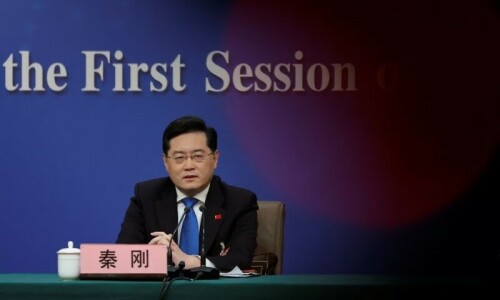JERUSALEM: The Saudi-Iran detente sets back Israeli Prime Minister Benjamin Netanyahu’s efforts to isolate Tehran, but time will tell whether it also hinders his outreach to Riyadh or planning for any eventual military strike against Iranian nuclear sites.
The more pressing worry for Israel, some experts argue, is that Friday’s Chinese-brokered deal between the top Muslim powers suggests the United States is giving ground in the region just when the Netanyahu government needs it most.
An Israeli official who requested anonymity described the detente as an unsurprising and preliminary process that should not hinder any parallel progress towards normalisation between Israel and Saudi Arabia. After all, Israel has drawn close to the United Arab Emirates despite Abu Dhabi also engaging Tehran.
Meanwhile, Israel is keeping up a campaign of veiled threats to attack Iran alone if it deems nuclear diplomacy a dead end. But all scenarios still hinge on Washington — a sponsor and sweetener of Israeli-Arab peace accords and guardian ally which, if it red-lights military action, Israel will be loath to cross.
“This is a brilliant stroke by China and Iran to undercut Saudi-American and Saudi-Israeli normalisation. It helps bring Tehran in from the cold and undermines American and Israeli efforts to build a regional coalition to confront Iran as it is on the cusp of developing nuclear weapons,” said Mark Dubowitz, CEO of the Foundation for Defence of Democracies in Washington.
There are unrelated strains on the Israeli-US alliance, however. The Democratic administration of President Joe Biden, which has yet to invite Netanyahu to the White House, has voiced unusually strong concern at his religious-nationalist coalition.
Netanyahu is also beset by unprecedented mass demonstrations in Israel against his judicial overhaul push. The protests have included pledges by some air force reservists not to turn up for training, a signal that combat readiness and morale have been shaken.
Amos Yadlin, a former military intelligence chief under Netanyahu, said the Saudi-Iran detente should be a wake-up call.
“The government’s focus on the judicial overhaul, which is tearing the nation apart and weakening Israel in all dimensions, reflects a deep disconnect between Netanyahu and international geopolitical trends,” Yadlin said on Twitter.

Accusing Netanyahu of “generating extraordinary damage to our national security,” Yadlin said he should scrap the reforms — which critics call an attempt to subordinate the courts to the government — and close ranks with Biden on how to forge Israeli-Saudi ties and jointly tackle Iran’s nuclear programme.
That suggested that Yadlin — who was among pilots who bombed Iraq’s nuclear reactor in 1981 and served as a top general during Israel’s 2007 attack on a suspected reactor in Syria — may not place much store in Israel’s ability to go solo against Iran, whose nuclear sites are distant, dispersed and defended.
Similarly, Ehud Barak, a former Netanyahu defence minister turned political critic, described Iran as “marching confidently towards becoming a de facto nuclear threshold state”. “US-Israeli coordination appears to be strong in the defence sphere but weak and in need of change in the offence sphere,” he wrote in the best-selling Yedioth Ahronoth daily.
Published in Dawn, March 13th, 2023















































Dear visitor, the comments section is undergoing an overhaul and will return soon.